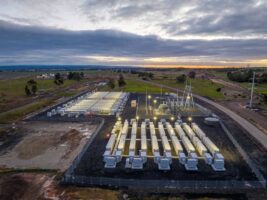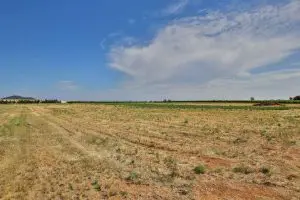ASX-listed thermal energy storage hopeful 1414 Degrees is considering doubling the storage capacity of the big battery component of its Aurora Energy Project in South Australia’s Port Augusta to 140MWh, and holding off on the solar component, to improve the project’s business case.
1414 Degrees, or 14D, picked up the abandoned Aurora Solar Tower Project in late 2019 as part of a deal to acquire the Australian assets of the failed US solar tower developer, SolarReserve. At that time, the project had development approval for a 150MW concentrated solar thermal plant and a 70MW solar PV plant.
14D had proposed to use the site to pilot its silicon-based thermal energy storage system, or TESS-GRID technology, which it said could deliver electricity firming services to similar scale as the solar power tower project (135MW of effective capacity and eight hours of storage).
The company had then planned to seek to vary or submit a new development application to provide up to 400MW of solar PV together with TESS-GRID technology with storage capacity that would be progressively scaled up to “several thousand MWh.”
This has since been refined to a project of several phases, the first featuring 70MW of solar and a 70MW/70MWh battery energy storage system, the second featuring the company’s proprietary TESS technology which is intended to provide over 1GWh of grid-scale storage.
A vague third phase which would turn the project into a “hybrid power station” and include “other technologies such as CSP,” was brought into slightly clearer detail in September 2020 after an MoU was signed between 14D and Vast Solar.
In an ASX update published on Wednesday, 14D said it had revised the modelling for the Aurora project to identify the highest return-lowest risk outcome for shareholders, as well as restructured the project team.
“Additional energy market expertise has been brought into the team, particularly to refine the business case modelling of spot energy prices and Frequency Control Ancillary Service (FCAS) revenues,” the announcement said.
To this end, the revised modelling suggested that increasing the BESS size from 70MW/70MWh to 140MWh (subject to transmission connections) would deliver higher revenue streams from merchant generation and FCAS.
“The BESS will be positioned for further revenue upside from merchant and FCAS as thermal power stations continue to exit the market due to renewable penetration and low wholesale electricity prices,” the company statement said.
“A BESS with merchant earnings is attractive to potential project financiers in the current wholesale electricity market conditions.”
The revised modelling also found that postponing the 70MW solar component, originally planned for the first stage of the Aurora development alongside the battery, would “substantially” cut capex costs and remove the need to secure power purchase agreements, which were currently at “historic lows.”
This would constitute a significant change of plans from 14D, which as recently as December of last year confirmed it was proceeding with design of a substation and advancing a transmission connection agreement for a planned first stage with 70MW of solar and 70MWh of battery energy storage.
The company had already suffered a setback on the TESS part of the equation – which is still slated to be delivered in phase two of the project sometime in 2023 – when the results of a review of the technology, delivered in June of last year, found it falling short on key metrics.
The review, commissioned by the company’s own executive chairman Kevin Moriarty, found that 14D’s core technology, its long-duration thermal energy storage system (TESS), required further development work to be “commercially robust,” particularly in terms of efficiency and reliability.
The notably frank and transparent review update also found that earlier expectations for sales were “optimistic,” and that a fully developed electric charging TESS was not currently competitive with fossil fuel heating.










